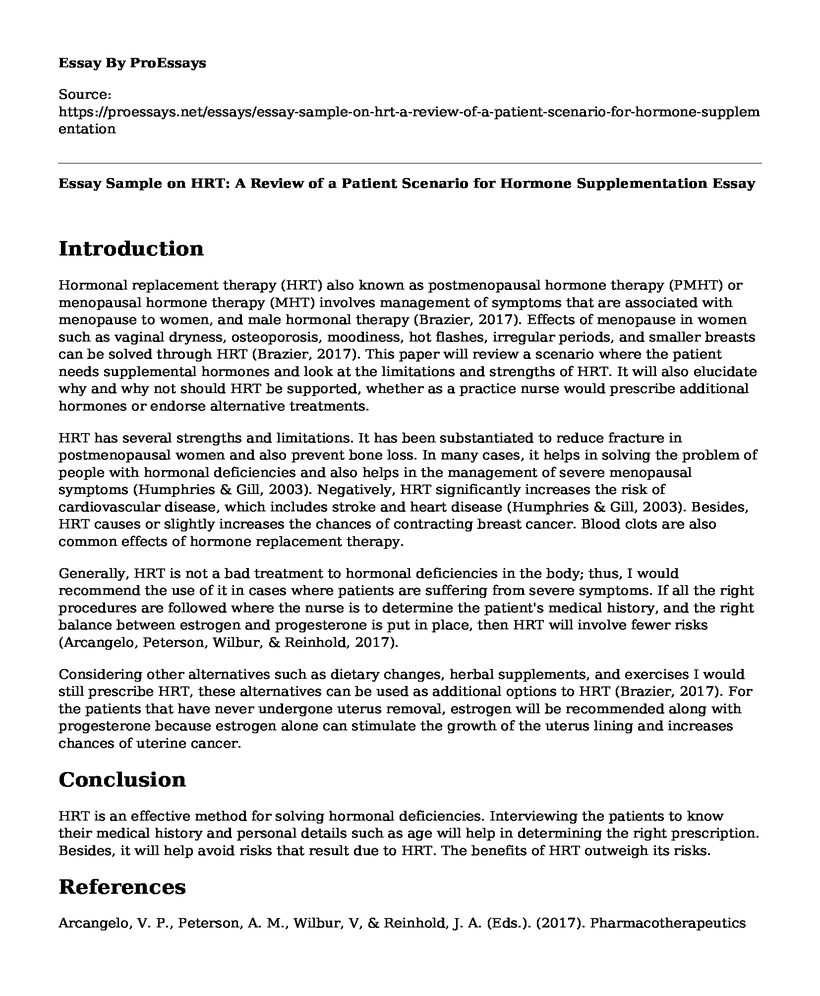Introduction
Hormonal replacement therapy (HRT) also known as postmenopausal hormone therapy (PMHT) or menopausal hormone therapy (MHT) involves management of symptoms that are associated with menopause to women, and male hormonal therapy (Brazier, 2017). Effects of menopause in women such as vaginal dryness, osteoporosis, moodiness, hot flashes, irregular periods, and smaller breasts can be solved through HRT (Brazier, 2017). This paper will review a scenario where the patient needs supplemental hormones and look at the limitations and strengths of HRT. It will also elucidate why and why not should HRT be supported, whether as a practice nurse would prescribe additional hormones or endorse alternative treatments.
HRT has several strengths and limitations. It has been substantiated to reduce fracture in postmenopausal women and also prevent bone loss. In many cases, it helps in solving the problem of people with hormonal deficiencies and also helps in the management of severe menopausal symptoms (Humphries & Gill, 2003). Negatively, HRT significantly increases the risk of cardiovascular disease, which includes stroke and heart disease (Humphries & Gill, 2003). Besides, HRT causes or slightly increases the chances of contracting breast cancer. Blood clots are also common effects of hormone replacement therapy.
Generally, HRT is not a bad treatment to hormonal deficiencies in the body; thus, I would recommend the use of it in cases where patients are suffering from severe symptoms. If all the right procedures are followed where the nurse is to determine the patient's medical history, and the right balance between estrogen and progesterone is put in place, then HRT will involve fewer risks (Arcangelo, Peterson, Wilbur, & Reinhold, 2017).
Considering other alternatives such as dietary changes, herbal supplements, and exercises I would still prescribe HRT, these alternatives can be used as additional options to HRT (Brazier, 2017). For the patients that have never undergone uterus removal, estrogen will be recommended along with progesterone because estrogen alone can stimulate the growth of the uterus lining and increases chances of uterine cancer.
Conclusion
HRT is an effective method for solving hormonal deficiencies. Interviewing the patients to know their medical history and personal details such as age will help in determining the right prescription. Besides, it will help avoid risks that result due to HRT. The benefits of HRT outweigh its risks.
References
Arcangelo, V. P., Peterson, A. M., Wilbur, V, & Reinhold, J. A. (Eds.). (2017). Pharmacotherapeutics for advanced practice: practical approach (4th ed.). Ambler, PA: Lippincott Williams & Wilkins. Retrieved from https://www.academia.edu/17991062/Pharmacotherapeutics_for_Advanced_Practice
Brazier. Y (2017). What you need to know about HRT. Medical news today. Retrieved from https://www.medicalnewstoday.com/articles/181726.php
Humphries, K. H., & Gill, S. (2003). Risks and benefits of hormone replacement therapy: the evidence speaks. Cmaj, 168(8), 1001-1010.
Cite this page
Essay Sample on HRT: A Review of a Patient Scenario for Hormone Supplementation. (2023, Jan 30). Retrieved from https://proessays.net/essays/essay-sample-on-hrt-a-review-of-a-patient-scenario-for-hormone-supplementation
If you are the original author of this essay and no longer wish to have it published on the ProEssays website, please click below to request its removal:
- Xarelto/Rivaroxaban
- Course Work Example: Definition and Scope of Practice of Advanced Practice Registered Nurses
- Essay Sample on The Impact of Age on Cognition
- Paper Example on Creating a Weekly Eating Plan: Easy and Nutritious
- Essay Example on Social Care Providers: Understanding Social Cognitive Theory
- Essay Example on Leadership in Nursing: Benefits of Leadership Learning Experience (LLE)
- Essay Example on The Coronavirus Pandemic: Impact on Global Social & Economic Development







